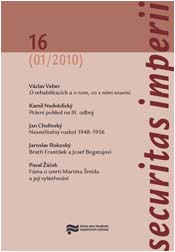Bratři František a Josef Bogatajovi Protikomunistický odboj na jižní Moravě
The brothers František and Josef Bogataj Anti-communist resistance in south Moravia
Author(s): Jaroslav RokoskýSubject(s): Security and defense, WW II and following years (1940 - 1949), Post-War period (1950 - 1989), History of Communism
Published by: Ústav pro studium totalitních režimů
Keywords: František Bogata; Josef Bogata; anti-communist resistance; south Moravia;Czechoslavakia;
Summary/Abstract: In modern Czech history, there are more than a few personalities whose names, and whose actions in particular, have been all but overlooked by several generations. For the most part, they were characters whose life and attitude went beyond the ideology that pervaded Czech history after February 1948. The names of these men and women were not included in the official versions of events, which the totalitarian regime “adapted” according to the needs of that time. They were forced out to the margins and kept a secret until they were completely forgotten. This is also true of the Bogataj brothers, two prominent figures in the anti-Nazi and anti-communist resistance movements, who defended freedom and democracy in Czechoslovakia. At the end of 1948, an anti-communist resistance group was created in the Zlínsko region, comprising more than 20 people. It was led by the former Czechoslovak Army Major František Bogataj (who was an officer with the Allied forces and a paratrooper during the occupation as well as a founder of the CARBON group). After being expelled from the army, he escaped to West Germany. It was through him that the group linked up with the US Army’s Counterintelligence Corps (CIC). Espionage was the group’s mission, in which František’s brother Josef Bogataj played a pivotal role. (He had also been an officer with Allied forces during the occupation.) They obtained important political, economic and military information. The reports they acquired were passed on by the group’s members via dead-letter boxes. These were subsequently collected by the courier Štěpán Gavenda. The group believed that the communist regime would soon collapse and they prepared for this. Their other activity consisted of organising the transfer of people across the Czechoslovak border. The State Security services, however, discovered their activity and arrested members of the anti-communist resistance. This study also maps their persecution, from savage interrogations through to their trials at the State Court at the turn of February and March 1951, and their subsequent long-term incarceration in communist jails. František Bogataj led his own intelligence group in Germany until 1954. After his activities ended, he left for the United States, where he lived out the second half of his life. He never returned home from exile. His elder brother Josef returned from prison to Uherský Ostroh, where he died shortly afterwards. The courier Štěpán Gavenda ended up on the gallows (1954). It was a high price to pay for joining resistance to the communist regime. Their courage, defiance and determination is worthy of respect and deference.
Journal: Securitas imperii
- Issue Year: 2010
- Issue No: 16
- Page Range: 88-133
- Page Count: 46
- Language: Czech

